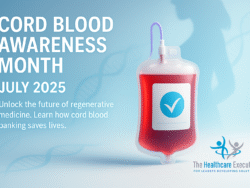National Nutrition Month 2025: Leveraging Digital Health to Reduce Food Insecurity

- Posted by Greg Wahlstrom, MBA, HCM
- Posted in Health Observance Calendar
Hospital Executives Must Integrate Nutrition Strategy into Population Health and Digital Care Delivery
Published: March 1, 2025
Every March, National Nutrition Month calls attention to the essential role of nutrition in long-term health outcomes. In 2025, that role is evolving—with food insecurity, digital access, and population risk stratification converging into new challenges for health systems. According to the Feeding America Meal Gap report, more than 44 million people in the U.S., including 1 in 5 children, face food insecurity. Hospital executives can no longer treat nutrition services as peripheral; instead, they must integrate nutrition data into population health platforms, care navigation, and SDOH initiatives. At Kaiser Permanente, digital screening for food insecurity is embedded into electronic health records (EHRs), triggering real-time referrals to food pharmacies and community partners. These strategies turn awareness into action—and they begin at the executive level.
Clinical dietitians are often underutilized in strategic planning, yet they are critical to managing chronic disease, improving recovery rates, and achieving value-based care metrics. At University of Rochester Medical Center, registered dietitians are integrated into every inpatient unit, participating in interdisciplinary rounds and quality improvement projects. Hospital executives must expand this model by creating dedicated leadership pathways for clinical dietitians—allowing them to influence population health strategy, inform payer negotiations, and lead innovation initiatives. Executive leaders must also embed nutrition performance indicators in operational dashboards to ensure accountability. Strategic nutrition leadership improves care and reduces avoidable costs—especially for vulnerable populations affected by both chronic illness and hunger.
Digital innovation is accelerating in the nutrition space, offering new tools for real-time patient monitoring and behavioral nudging. At Mass General Hospital, a new digital nutrition pilot offers meal planning, grocery delivery, and dietitian check-ins via mobile app, tailored to diabetes and heart failure patients. Hospital executives should evaluate how such tools can be scaled, reimbursed, and integrated into post-discharge protocols. Tele-nutrition programs, app-based interventions, and wearable integrations are no longer experimental—they are essential assets in the shift toward digitally enabled care. Executives must prioritize partnerships with digital nutrition platforms and ensure clinical oversight through dietitian-led governance models.
Nutrition strategy is also a racial and economic equity issue. Communities of color disproportionately face food deserts, underfunded nutrition programs, and limited access to culturally appropriate dietary counseling. The New York City Nutrition Strategy includes culturally adapted dietary education and citywide produce incentive programs, which can serve as a national blueprint. Hospital leaders must audit access gaps, track outcomes by race and ZIP code, and commit to nutrition equity as a strategic metric—not just a social program. Expanding bilingual dietitian staffing, supporting food is medicine initiatives, and linking Medicaid contracts to nutrition quality metrics are all actionable steps. The executive lens must zoom out from short-term care episodes to long-term food justice solutions.
National Nutrition Month 2025 is an opportunity for healthcare executives to treat food as a clinical input, not just a lifestyle factor. Data-backed nutrition strategy should be woven into clinical workflows, community benefit planning, and digital front doors. As seen in Children’s Hospital of Philadelphia, pediatric malnutrition protocols have become embedded in hospital-wide standards, linking nutrition status to clinical safety goals. Leadership must elevate nutrition departments as essential contributors to system-wide outcomes. Investing in food equity, digital tools, and clinical dietitian leadership is no longer optional. It is foundational to modern healthcare delivery, and executive action must lead the way forward.
Discover More on Strategic Nutrition and Equity
Explore how your hospital can scale high-impact nutrition programs with digital partnerships, equity analytics, and clinical alignment in our related blog post.
Internal Links
- Trust as a Strategic Asset: Reputation, Outcomes, and the Patient Voice
- The New Face of Healthcare Leadership: Inclusive Succession Planning Strategies
External Links
- National Nutrition Month – Academy of Nutrition and Dietetics
- Feeding America – Meal Gap Data
- Kaiser Permanente – Nutrition Programs
- University of Rochester Medical Center – Nutrition Services
- Mass General – Digital Nutrition Pilot
- New York City – Neighborhood Nutrition Strategy
- Children’s Hospital of Philadelphia – Clinical Nutrition



